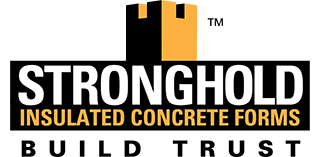
When considering modern wall construction, Stronghold ICF (Insulating Concrete Forms) stands out as a high-performance alternative to traditional CMU (Concrete Masonry Units, or concrete block). Below is a focused comparison, highlighting the unique benefits of building with Stronghold ICF.
What Are ICF and CMU?
- ICF: Hollow foam blocks or panels that are stacked and filled with reinforced concrete, creating a monolithic, insulated wall.
- CMU: Traditional concrete blocks (cinder blocks) stacked and mortared together, often requiring additional insulation and reinforcement.
Key Differences
| FEATURE | STRONGHOLD ICF | CMU |
| Insulation | Continuous, built-in (R-23 to R-48) | Low (R-4 to R-14), needs extra insulation |
| Strength | Monolithic, reinforced concrete core | Block-by-block, less monolithic |
| Speed of Construction | Faster, fewer labor hours, lighter forms | Slower, heavier blocks, more labor |
| Energy Efficiency | Superior, airtight, minimal thermal bridging | Lower, more air leakage |
| Cost | Often less expensive when all factors included | Appears cheaper, but hidden costs |
| Design Flexibility | High, easy to shape and finish | More limited, heavier to modify |
| Fire/Disaster Resistance | Excellent (4-hour fire rating, disaster resilient) | Good, but less than ICF |
| Soundproofing | Excellent | Good |
| Durability | High, resists rot, mold, pests | High, but may need more maintenance |
Benefits of Building with Stronghold ICF
1. Superior Thermal Performance
- Stronghold ICF’s dual 2.75″ foam panels provide up to R-24 insulation, far exceeding standard CMU walls. This continuous insulation, combined with the airtight concrete core, minimizes heat loss and air infiltration, resulting in lower energy bills and more comfortable indoor temperatures.
2. Faster, Easier Construction
- The design of Stronghold ICF blocks—vertical locking webs, reversible interlocks, and foldable options—means walls go up quickly and straight, with less labor and fewer errors. One Stronghold ICF block replaces multiple CMU blocks, and the lightweight design reduces physical strain and speeds up installation.
3. Lower Total Cost
- While CMU may seem cheaper initially, the true cost rises when factoring in required extras: insulation, waterproofing, furring for drywall, and additional labor. Stronghold ICF integrates these features, often resulting in a lower total installed cost and ongoing energy savings.
4. Structural Strength and Safety
- Stronghold ICF’s reinforced, monolithic concrete core and robust corner design provide exceptional resistance to wind, fire, and seismic events. The system is engineered to prevent blowouts and settling during concrete pours, ensuring long-term durability and safety.
5. Design Flexibility and Less Waste
- With a range of block sizes, shapes, and foldable options, Stronghold ICF adapts to diverse architectural needs. The reversible interlock and easy cutting lines reduce waste and simplify on-site adjustments.
6. Healthier, Quieter Buildings
- The airtight, insulated wall assembly blocks outside noise and helps maintain superior indoor air quality, contributing to a healthier, more peaceful environment.
Conclusion
Stronghold ICF offers a comprehensive, contractor-friendly solution that outperforms CMU in thermal efficiency, speed, cost-effectiveness, and structural integrity. Its innovative features—like robust corners, foldable blocks, and integrated insulation—make it a top choice for builders seeking high-performance, resilient, and energy-efficient structures.
